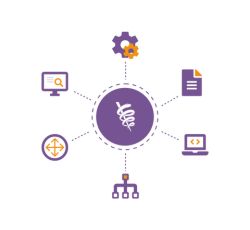Claims Submission in Healthcare
Claim submission is one of the key processes in health care because this ensures that service providers get remunerated on time. Submitting healthcare claims to payers, for instance, be it insurance firms, will yield reimbursement for those services rendered. It falls in medical billing and indeed has implications on revenue cycles for practices or facilities involved for a given health care provider.
What is Claims Submission?
Claim submission refers to the submission of a claim or demand for payment to an insurance company or other payer following a patient receiving health care. This encompasses claim detail, which is essentially a list of the service rendered, the diagnosis of the patient, and the procedures involved.
There are two main types of claims in the healthcare industry:
- Paper Claims: These are written claims submitted on a paper claim form that are either the CMS-1500 or UB-04. One then has to forward this by mail to the intended insurance company.
- Electronic Claim: E-Claims, refer to claims a provider submits electronically through secure online channels or health information exchanges. Processing and payment for this are much faster and easier.
Importance of Claims Submission
- Revenue Cycle Management: Claims submission is one of the important revenue cycle management components for healthcare providers. Smooth claims submission will ensure that payments are made on time, delays are minimized, and there is a steady cash flow in a healthcare practice.
- Reimbursement from the Insurance Company: The key objective of any claim is the payment for a provider's rendered services. One part of the costs will be reimbursed by an insurance company, as well as other governmental programs including Medicare and Medicaid, while a patient pays for the co-pay or deductible.
- Record Keeping and Documentation: Claim submissions do record the keeping of the number of services offered, treatment given to a patient, accounting records, and how compliance has been adhered to.
- Regulatory compliance: Claims are expected to have stipulations set in place by insurance providers and also governmental regulations. Lack of regulatory compliance may be punishable by levied fines or audits, plus potential loss of reimbursement.
- Preventing Losses in Finances: Ensuring claims are filed appropriately prevents healthcare providers from becoming underpaid or denied when it comes to services rendered. Without claims submissions, they may miss receiving payment on certain services, which can be straining in their finances.
Steps Involved in Claims Submission
Step 1: Gather Information
Healthcare providers must gather all the information related to the patient and services rendered prior to filing a claim. This includes:
- Patient details (name, date of birth, insurance)
- Diagnosis codes (ICD codes)
- Procedure codes (CPT or HCPCS codes)
- Date of service
- Provider details (name, NPI number)
- Insurance policy number
Step 2: Validate Patient Insurance
Before a claim is made, one must check the patient's insurance coverage. This way, one knows what services the patient is supposed to pay for and which ones will be covered for him. Online tools that make eligibility verification instantaneously available will confirm this; even the provider will be consulted on the status.
Step 3: Prepare the Claim
Paper claims: A type of form (CMS-1500 for physician's services or UB-04 for hospital services) that is usually attached to the claim for the service.
Electronic claims: Using medical billing software to format a claim which, through their capabilities, pre-enters standardized electronic claims information into any required format as the ANSI 837 format for the healthcare environment.
Step 4: Submit a Claim
Submission to the insurance company or payer; after preparing a claim, submit it to an insurance company or payer. Claims are usually submitted electronically because they are faster and more accurate. It is now easier and much more efficient because of Electronic Health Records (EHR) and medical billing software.
Step 5: Review and adjudication of claims
Once the claim comes in, a payer examines the claim. They should be able to determine whether the claim meets every requirement. For example, errors in coding for the review or the patient ineligibility status and service status will be recognized. After these checks are finalized, the decision to accept a claim for a payment or even deny it stands.
Step 6: Payment/Denial
If a claim is accepted, the provider will be paid depending on what insurance covers the patient. If a claim is rejected, the healthcare provider ought to find out why the claim was rejected and how corrective measures should be taken. One can re-submit the claim, make the necessary corrections, or appeal if the cause of rejection is invalid.
Step 7: Follow Up
Follow-up is necessary if the payment is delayed or denied. This can include calling the insurance company to clarify any issues or discrepancies, resubmitting documentation, or appealing the claim.
.png_1743080795.png)
Challenges in Claims Submission
1. Complexity of the Insurance Policy
Claims processes differ with each insurance firm. Every insurance provider might have different billing codes, documentation requirements, and time to comply with its rules. The complexity is bound to make things complicated for the service providers, as they would be handling numerous different insurance firms at the same time.
2. Coding Errors
It uses standardized codes as well, ICD, which represents the International Classification of Diseases, and also CPT, or Current Procedural Terminology. Inputting an erroneous code or an omission of major key information could get the claim refused. Even trivial mistakes would again retard when the money gets received and getting corrections will also be a real pain.
3. Claim Rejections
Insurance companies mostly deny claims based on various reasons. Some of the popular reasons include;
- The patient information is incorrect in terms of a patient's name, date of birth, and insurance.
- The treatment provided is not covered by health insurance.
- Documentation of a claim is not detailed.
4. Delayed Payment
Even after proper claims submission, insurance companies may take time to process such claims. The payments may arrive late, which may put healthcare providers in cash flow to pay employees' salaries and drugs.
5. Regulations and Laws
The rules and regulations on healthcare billing from the government are always changing now and then. For this reason, providers need to be up to date on those requirements so their claims do not get denied at the back end. Nonadherence to the latest rules and regulations can also result in a claim denial, imposing monetary penalties, or an audit
How Meru Accounting Can Help with Claims Submission
1. Claims preparation and submission accurately
Meru Accounting checks on patient details and correct coding and documentation. We submit claims, either electronically or in written form, ensuring that all submissions meet the demands of each insurance company.
2. Checking and following up on claims
Once the claim is raised, Meru Accounting thoroughly keeps a check on its status and calls the insurance company to settle the disputes. This works effectively for the speedy process and avoids meaningless delay time.
3. Claim Audits for Error Prevention
Meru Accounting evaluates all claims deeply to reduce errors, and submitting error-free claims helps reduce claim denial and accelerates approval from the insurance provider.
4. Handling Denied Claims
If a claim is denied, Meru Accounting identifies the reason, corrects any mistakes, and resubmits the claim quickly. We also analyze denial patterns and suggest improvements to prevent future denials.
5. Complete Revenue Cycle Management
Meru Accounting goes beyond claims submission by offering full revenue cycle management services. This includes handling payment posting, patient billing, and financial reporting to ensure healthcare providers maintain a steady cash flow.
Conclusion
Healthcare providers can have a good and timely payment in exchange for healthcare services rendered with proper practices and staying updated about insurance requirements as well as proper use of reliable billing software. Some challenges when it comes to submitting claims can be avoided through professional help, such as from experts at Meru Accounting, which helps healthcare providers in working out effectively the process of submitting claims. Proper claims submission eventually helps a healthcare provider maintain financial health and be able to focus on the care of patients.
Our Bookkeeping And Writeup Process

Your Need
Search the Service You need

Enquiry
For enquiring make a call or mail us

Confirm
Get your Quote and confirm us

Stay Calm
Feel free and Relax Yourself

Effective budgeting and forecasting are crucial elements of strategic financial management, offering a structured pathway to business success.
Read MoreStarting a new business is exciting and it’s full of opportunities and challenges. At Meru Accounting, we understand the complexity involved and we provide comprehensive Business Start-Up ...
Read MoreCost control and reduction strategies are important elements of any organization's financial management structure. In the competitive marketplace, businesses must precisely manage their expe...
Read More
Due diligence services refer to a set of investigative procedures and assessments conducted by professionals, typically in accounting, finance, law, or consulting fields, to evaluate a business,...
Read More
Risk management is a crucial process employed by organizations to identify, assess, and prioritize potential risks that could hinder their objectives.
Read More
Business Process Optimization (BPO) is a strategic approach aimed at enhancing efficiency, reducing costs, and improving overall performance within organizations.
Read More
Financial restructuring is a strategic process that involves reorganizing a company’s financial framework to improve its stability and performance.
Read More
Although launching a business is an exciting endeavour, there are risks and difficulties associated with it. Effective financial management is essential to the success of every start-up, and it ...
Read More
Performance and improvement consulting is pivotal for businesses seeking to optimize operations and achieve sustainable growth.
Read More
Forensic accounting is a specialized area of accounting that involves investigation of financial records to detect fraud, theft, or other financial crimes.
Read More
Software implementation is a vital phase in the lifecycle of any software application. It involves a series of steps designed to ensure that the software is correctly installed and configured to...
Read More
Project accounting is a specialized branch of accounting that focuses on tracking and managing the financial aspects of a specific project throughout its lifecycle.
Read More
In the modern business environment, companies are increasingly recognizing the importance of nurturing not just the professional growth but also the financial well-being of their employees.
Read More
Handling accounts payable is an essential part of managing a business’s finances. It involves tracking and paying invoices, maintaining good vendor relationships, and ensuring cash flow re...
Read More
Medical billing plays a very central role in the healthcare area.
Read More
Patient registration is the first and the most important when a person steps into a hospital, clinic, or any medical facility.
Read More
Insurance verification is among the most integral steps in medical billing. Before providing even a single health service,
Read More
Medical coding refers to the procedure of converting diagnoses, procedures, medical service, and other forms of medical equipment into...
Read More
Claim submission is one of the key processes in health care because this ensures that service providers get remunerated on time.
Read More
Payment posting would be one of the most significant steps in any medical billing cycle so that healthcare providers will get paid for...
Read More
Denial management is one of the important processes in medical billing because it makes sure that the providers of health services...
Read More
Reporting and analytics are crucial parts of medical billing. They will help healthcare providers follow up on the financial performan...
Read More

